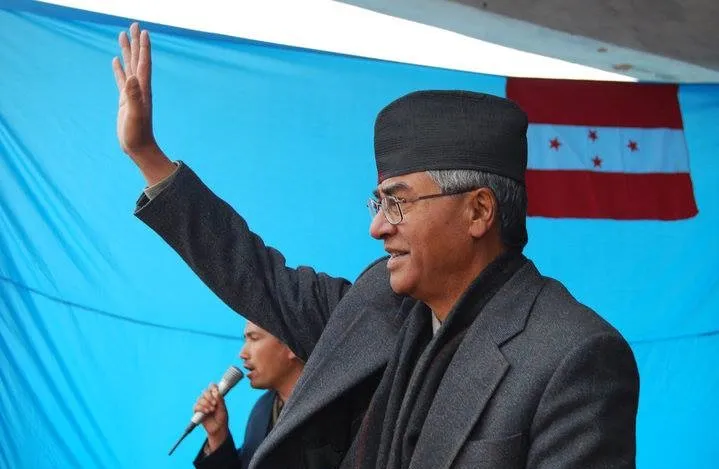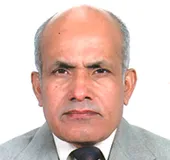
Sher Bahadur Deuba, the leader of the Nepali Congress, became the Prime Minister of Nepal on 13 July after Nepal’s
Supreme Court in its verdict found that he had majority support in the House of Representatives (HoR), the Nepalese Parliament. Along with this verdict, the HoR that was dissolved the second time was also reconstituted. With this development, the 40-month long communist government under K.P. Sharma Oli collapsed almost one-an-a-half years before the scheduled period.
The 75-year Deuba, who is often branded as a democratic leader with a tilt towards the West, is not a novice with the domestic and foreign issues of Nepal. This is his fifth stint as Prime Minister of the country. He was previously PM in 1995-97, 2001-2002, 2004-2005, and 2017-2018. Nonetheless, his coalition government, which has been formed with the support of Maoist-Centre and Janata Samajbadi Party (JSP), is finding uphill challenges, both in the domestic front as well as in foreign affairs.
Because of the unavailability of the AstraZeneca Covishield vaccine, 1.4 million senior citizens who were given the first dose of this vaccine in March have not received the second dose as of yet.
On the domestic front, Deuba’s government has to ensure that the poor and underprivileged in the country are inoculated with COVID-19 vaccines at the earliest. As of 20 August 2021, only
17 percent of the country’s eligible population have received the first dose of the vaccine against
13 percent of the people who are fully vaccinated. Because of the unavailability of the AstraZeneca Covishield vaccine, 1.4 million senior citizens who were given the first dose of this vaccine in March have not received the second dose as of yet.
Many people in Nepal breathed their last both during the first and second wave of the coronavirus because of their inability to be administered with the COVID-19 vaccine. The latest available data shows that ever since the epidemic began, Nepal has recorded
10,750 deaths and
76,2647 cases of infection. It is a pity that even in a tiny Himalayan country like Bhutan has
over 90 percent of the population fully vaccinated, while in Nepal, only a meagre section of the population have been vaccinated so far.
Another challenge before Prime Minister Deuba is to ensure the stability of his coalition government. In the Parliament of 275 lawmakers, the Nepali Congress, of which he is the leader, has just 61 lawmakers, while its coalition partner, the CPN-Maoist Centre, led by Pushpa Kamal Dahal has 48 lawmakers and the JSP, led by Mahanth Thakur and Upendra Yadav has 32 lawmakers. On the other hand, the CPN-UML, of which former Prime Minister K.P. Sharma Oli is the leader, has 121 lawmakers in the Parliament. However, during the vote of confidence, Deuba got the support of his own party, the Nepali Congress, along with 48 members of the CPN-Maoist Centre and 32 members of JSP. In addition, he also got the support of 22 lawmakers from the Madhav Kumar Nepal faction of CPN-UML and eight additional lawmakers of Oli’s faction. Ideologically, and even otherwise, all those groups that supported Deuba during the confidence motion have their own interests and so any difference amongst them could risk the stability of his government. It is on account of these factors that he could not manage to properly constitute the government even a month after he took over as the Prime Minister. He is running his government with only four Ministers and one State Minister; since most of the Ministerial positions are vacant, his government is not fully functional.
Ideologically, and even otherwise, all those groups that supported Deuba during the confidence motion have their own interests and so any difference amongst them could risk the stability of his government.
Deuba’s other challenge is to bring a balance in relations between its two neighbours — India and China. When K.P. Sharma Oli was the Prime Minister, Nepal–India relations touched their lowest ebb on account of the controversies raised over the
Kalapani, Limpiyadhura, and Lipulekh region — territories that were claimed to be in the map of both countries. This was closely followed by several other decisions. For instance, Nepal’s 1,753-kilometre long border with India was sealed in March 2020 on the pretext of controlling the spread of COVID-19, but has not yet been made fully operational. Even Indian currencies above the denominations of INR 100 are banned in Nepal and vehicles with Indian number plates are not allowed to operate in the country. Another bone of contention is the work permit system that was recently introduced for foreign labourers, which mostly targets Indian labourers. Even Lord Ram’s birthplace, Ayodhya, is proclaimed to be in Nepal. Similarly, the train service between Jaynagar (India) to Kurtha (Janakpur) has not yet been made operational. In the later parts of his administration, Oli tried to bring Nepal’s relations with India on track, but at that time it was too late. Now it is Deuba’s responsibility to address these challenges.
Moreover, China is trying to erode India’s influence in Nepal not only through development projects, investment, and trade but also by making engagements with different political parties, the government, and the civil society. However, India does not want to lose its traditional hold in the country in the cultural, social, economic, and political arenas. The western countries that provide substantial portions of foreign aid in Nepal mostly work through the INGOs and NGOs. And, of late the petro-dollar of the Gulf countries have also started influencing the political decisions in the country. It is a herculean task before Prime Minister Deuba to keep all these forces within sizeable limit.
Prime Minister Deuba would also have a hard time implementing projects under China’s Belt and Road Initiative (BRI) and the Indo-Pacific Million Challenge Corporation (MCC) led by the United States (US). Nepal signed an agreement with China on the BRI in 2017. In the same year, it also signed an agreement with MCC at the State Department in Washington DC for the construction of 300 KV transmission lines in the Lapsiphedi-Galchhi-Damauli-Sunwal corridor and also for the maintenance of 300 km roads in Mechi, Koshi, Sagarmatha, Tribhuvan Rajpath and East-West Highway. For such activities, the MCC would provide grant assistance of US $50 million to Nepal.
Considering the rivalry between China and the US in Nepal, the section of society in support of the BRI vehemently oppose the MCC of the US in the same way as those supporting the MCC oppose BRI in the country. Ratification of the Parliament on MCC is required for its implementation, but no government ever since the country signed the agreement the MCC could dare to get it ratified through the Parliament. On several occasions in the past, Deuba committed to getting the MCC ratified by the Parliament, but under the pressure of the Maoist Centre that is tilted towards the north, Prime Minister Deuba could not put this agenda in the Common Minimum Programme of the present coalition government.
Considering the rivalry between China and the US in Nepal, the section of society in support of the BRI vehemently oppose the MCC of the US in the same way as those supporting the MCC oppose BRI in the country.
Only time will tell as to what extent Prime Minister Deuba can bring political stability, apart from addressing the menace of the COVID-19 pandemic in the country. Also, his task of removing certain irritant issues with India, balancing relations with its two giant neighbours, ratification of US-led Indo-Pacific MCC and controlling unwanted activities from other quarters are no less important. If he can convert some of these crucial challenges into opportunities, he will be remembered as a statesman, which could also help the Nepali Congress to win the forthcoming general elections in 2022. But any failure on any or all of these fronts would prove equally costly for the nation.
The views expressed above belong to the author(s). ORF research and analyses now available on Telegram! Click here to access our curated content — blogs, longforms and interviews.



 Sher Bahadur Deuba, the leader of the Nepali Congress, became the Prime Minister of Nepal on 13 July after Nepal’s
Sher Bahadur Deuba, the leader of the Nepali Congress, became the Prime Minister of Nepal on 13 July after Nepal’s  PREV
PREV


